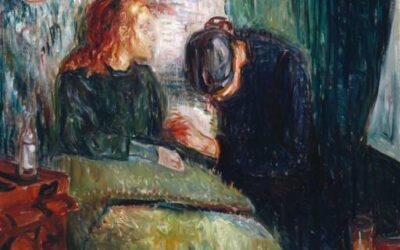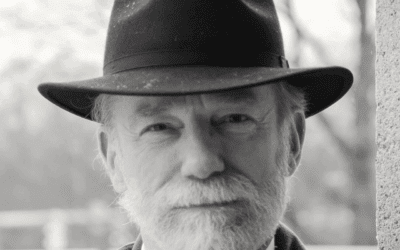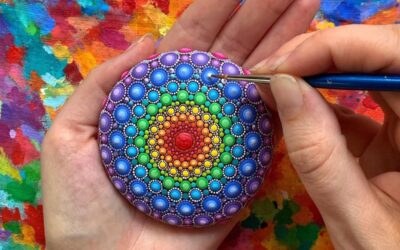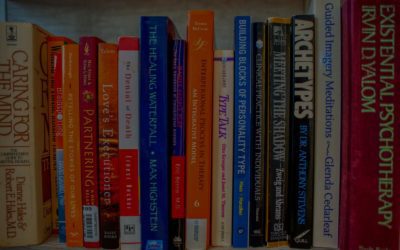
Reclaiming the Golden Shadow: Integrating Our Disowned Potential
In my work as a therapist, I often see this dynamic play out with my clients. They may come into therapy feeling fundamentally flawed, unworthy, or incapable in some way. Yet as they talk about the people they admire, a pattern begins to emerge.
A client may gush about their favorite musician’s incredible creativity and self-expression, or their partner’s unwavering confidence and ease in social situations. They may become enthralled listening to a particular author or speaker who seems to have such clarity of insight and groundbreaking ideas.
What these clients often fail to recognize, however, is that their ability to perceive and appreciate these qualities in others is a direct reflection of their own innate potential. They have a template within themselves that allows them to recognize and resonate with these traits.
In other words, we cannot see in others what we do not have some seed of within ourselves. If we were completely deficient in a particular quality, we would not have the eyes to see it and admire it in another. Our golden shadow is revealed through our projections, if we know how to look for it.
There are aspects of ourselves that we readily acknowledge and present to the world. These are the traits, capabilities, and qualities that fit neatly into our self-concept and that we feel comfortable embodying. But just as there are parts of ourselves that we openly embrace, there are also aspects that we hide, repress, or fail to recognize altogether.
In Jungian psychology, these disowned parts of the psyche are referred to as the “shadow.” While the shadow is often associated with negative traits, impulses, and behaviors that we reject, there is another, lesser-known aspect of the shadow that contains our hidden gifts, talents, and potentials. This is known as the “golden shadow.”
I talka bout the golden shadow in therapy with patients when they are mythologising partners, politicians, intellectuals, or therapists. All the therapists at Taproot Therapy Collective use these ideas at our Hoover, Alabama practice.
So, What is the Golden Shadow?
The golden shadow often emerges in the form of projections onto others. We might admire someone for their brilliance, creativity, compassion, or confidence without realizing that these very qualities exist within us as dormant potentials. By projecting them outward, we distance ourselves from these traits, believing that they belong exclusively to the other person. This can lead to idolization or envy, as we perceive others as embodying something we feel incapable of achieving ourselves.
However, the golden shadow is not meant to remain hidden or projected. Its purpose is to serve as a mirror, reflecting back the unrealized aspects of our own psyche. By recognizing our projections, we can begin the process of reclaiming these qualities and integrating them into our conscious self. This integration is a vital step in personal growth and individuation, as it allows us to move beyond feelings of inadequacy and step into the fullness of who we truly are.
Reclaiming the golden shadow requires courage, self-reflection, and often the guidance of practices like shadow work, therapy, or creative exploration. It is through this process that we uncover the “gold” within—our unique strengths, talents, and passions that can enrich both our own lives and the lives of others. Far from being a burdensome task, embracing the golden shadow is a liberating journey toward authenticity and self-empowerment.
The Golden Shadow in Projection
One of the key ways that the golden shadow makes itself known is through projection. When we have not integrated certain positive qualities within ourselves, we tend to project them onto others.
We may admire or even idealize people who embody the very traits that we have disowned. We might put certain individuals on a pedestal, seeing them as incredibly courageous, brilliant, talented, or enlightened. We may become enamored with public figures, celebrities, or even fictional characters who seem to possess an abundance of the qualities we feel lacking in ourselves.
In my work as a therapist, I often see this dynamic play out with my clients. They may come into therapy feeling fundamentally flawed, unworthy, or incapable in some way. Yet as they talk about the people they admire, a pattern begins to emerge.
A client may gush about their favorite musician’s incredible creativity and self-expression, or their partner’s unwavering confidence and ease in social situations. They may become enthralled listening to a particular author or speaker who seems to have such clarity of insight and groundbreaking ideas.
What these clients often fail to recognize, however, is that their ability to perceive and appreciate these qualities in others is a direct reflection of their own innate potential. They have a template within themselves that allows them to recognize and resonate with these traits.
In other words, we cannot see in others what we do not have some seed of within ourselves. If we were completely deficient in a particular quality, we would not have the eyes to see it and admire it in another. Our golden shadow is revealed through our projections, if we know how to look for it.
Reclaiming the Golden Shadow in Therapy
As a therapist, one of my key roles is to help clients reclaim their golden shadow. When a client is idealizing or admiring a certain quality in someone else, I gently point out that this is actually a reflection of their own potential.
I might say something like, “You know, the fact that you can so clearly see and appreciate that person’s creativity suggests that you have a well of creativity within yourself. If you were completely lacking in that quality, you wouldn’t be able to recognize it so readily in someone else.”
This is often met with resistance at first. Clients may argue vehemently that they could never be as insightful or as talented or as confident as the person they admire. And that is understandable. Reclaiming the golden shadow means taking responsibility for our own gifts and capabilities, and that can be a frightening prospect.
It is often easier, in the short term, to keep our light hidden. To remain in a place of false humility or victimhood, believing that we are deficient and that others have what we lack. Stepping into our power and potential can feel vulnerable and exposing.
But the cost of not integrating our golden shadow is high. When we don’t own our gifts, we may fall into patterns of codependency or dysfunctional relationships, always seeking outside validation and “missing pieces” in others. We may self-sabotage, subconsciously holding ourselves back from the very success and fulfillment we desire. We may remain stuck in cycles of resentment, always feeling “less than” in comparison to those onto whom we’ve projected our own light.
The path to wholeness and authentic empowerment is through golden shadow integration. It is through gradually acknowledging and embodying the very qualities we have disowned. This is a process of gently turning our gaze back onto ourselves, and recognizing that the light we see in others is a reflection of the light that resides within us.
The Golden Shadow in Politics
The concept of the golden shadow doesn’t just operate on an individual level – it also plays out in collective dynamics and political beliefs. When groups of people have collectively disowned certain positive traits, those qualities can become projected onto idealized leaders or demonized enemies.
In some left-leaning circles, there can be a tendency to over-identify with victimhood and powerlessness. The golden shadow of personal agency, discernment, and empowered action may be projected onto idealized activist figures or political movements that are seen as the sole saviors or truth-tellers.
There can be a knee-jerk rejection of anything that challenges a certain ideological narrative, as it threatens the illusion of powerlessness and moral superiority. Nuance, personal responsibility, and the ability to effect change through individual choices may be unconsciously disowned, as they contradict the narrative of pure victimization.
On the other hand, some right-leaning circles may reject qualities like sensitivity, compassion, and vulnerability, projecting them onto demonized outgroups seen as weak, inferior, or threatening to the social order. The golden shadow of their own disowned empathy and capacity for nuance is attacked in others, while qualities of toughness, certainty, and dominance are idealized and projected onto strongman leaders.
Across the political spectrum, unintegrated golden shadows manifest as self-righteousness, ideological possession, and the constant need for an enemy or “other” to attack and blame. When we are not in touch with our own inner complexity and capacity for the full range of human qualities, we will invariably project those disowned parts outward in a way that breeds division and conflict.
The antidote to this polarization is for each individual to do the work of golden shadow integration. As we each reclaim our disowned traits and capacities, we depolarize our own psyches. We become less magnetically pulled to ideological extremes, and more able to hold paradox, nuance, and multiplicity. We see that the world is not neatly divided into good and evil, victim and perpetrator, but that each of us contains the seeds of every human potential within us.
Integrating the Golden Shadow
So how do we actually go about integrating our golden shadow? The process begins with awareness and recognition. We start to notice the people and qualities we habitually admire or feel drawn to. We pay attention to the traits we long for or feel deficient in. These are clues to the contents of our golden shadow.
We can then begin to gently question our assumptions of deficiency. When we notice ourselves thinking, “I could never be that confident,” or “I wish I was that creative,” we can start to reframe it as, “I have the potential for confidence and creativity within me.” We can look for small ways that we already embody those qualities, even if it feels unfamiliar or uncomfortable at first.
It’s important to be patient and compassionate with ourselves in this process. Remember, these disowned parts often carry a sense of wounding or shame. They were exiled for a reason, often to protect us from some real or perceived threat to our safety or belonging. So the key is to create an internal environment of acceptance and encouragement as we begin to integrate them.
Here are some ways to support golden shadow integration:
- Notice who you admire. Pay attention to the people you look up to and the specific qualities that draw you to them. See if you can find small ways that you already embody those qualities, or how you could start to cultivate them.
- Question assumptions of deficiency. When you catch yourself thinking that you could never embody a certain positive trait, gently question that assumption. Look for counterexamples or small ways you could start to stretch into that quality.
- Take small risks to embody your potential. Experiment with expressing a quality you normally hide. Share an idea even though it feels vulnerable. Let yourself be seen in a way that feels unfamiliar. Take a small step in the direction of your disowned potential.
- Practice self-compassion. Be gentle with yourself as you integrate your golden shadow. Remember that it’s a gradual process and that there is no pressure to be perfect. Celebrate your efforts and be kind to yourself when it feels challenging.
- Notice your projections. When you find yourself idealizing or demonizing others, see if you can find that same quality within yourself. How might you be projecting your own disowned traits onto them? How could you start to own those qualities within yourself?
As we each do this inner work of reclaiming our golden shadows, we become more integrated and empowered human beings. We stop giving our power away to external figures or ideologies, and start recognizing the incredible potential that resides within us.
When we are no longer controlled by the compulsion to project our disowned parts, we can approach the world with more clarity, nuance, and compassion. We can engage in more authentic dialogue and collaboration, as we are not as magnetically pulled to polarized extremes. We can effect change from a place of wholeness and agency, rather than victimhood and reactivity.
In this way, golden shadow integration is not just a personal growth practice, but a vital piece of collective healing and transformation. As each of us reclaims our full humanity, we create a world where all people can shine their unique light and offer their gifts to the greater whole. We move from a paradigm of division and projection to one of integration and empowered co-creation.
So let us each commit to the lifelong journey of reclaiming our golden shadows. Let us have the courage to acknowledge our disowned brilliance, and to step into the fullness of who we truly are. In doing so, we not only transform ourselves, but we create ripples of transformation that touch all those around us. We become beacons of light, inspiring others to claim their own hidden gold. And together, we weave a world of authentic expression, radiant potential, and true wholeness.
Originators of the Golden Shadow
- Carl Jung
While Jung did not use the term “golden shadow,” he laid the groundwork for it by emphasizing that the shadow includes not only negative, repressed traits but also positive, latent qualities that we project onto others. His works such as Aion, The Archetypes and the Collective Unconscious, and Psychological Types explore these dynamics. - Robert A. Johnson
Johnson explicitly popularized the concept of the golden shadow in his book Owning Your Own Shadow: Understanding the Dark Side of the Psyche. He emphasized the need to reclaim the positive traits we project onto others and provided practical insights into integrating the golden shadow. - Marion Woodman
Woodman discussed the golden shadow in her works, particularly in relation to creativity, the sacred feminine, and embodied transformation. Books like Addiction to Perfection and The Pregnant Virgin explore these themes. - Jean Shinoda Bolen
In books such as Goddesses in Everywoman and The Tao of Psychology, Bolen touched on shadow dynamics, including the recognition and integration of positive projections that correspond to the golden shadow. - James Hollis
Hollis wrote about the golden shadow in the context of personal growth and meaning-making in books like The Middle Passage and Finding Meaning in the Second Half of Life. He explored how reclaiming the golden shadow can help individuals uncover their deeper potential. - Edward Whitmont
In The Symbolic Quest, Whitmont explored projection dynamics and touched on the golden shadow as a process of reclaiming the unacknowledged positive potentials that we see in others. - Clarissa Pinkola Estés
While not always using the term explicitly, Estés discussed the concept of reclaiming positive traits hidden in the shadow in her book Women Who Run With the Wolves. Her work focuses on reconnecting with the instinctual, creative self. - Ken Wilber
Wilber integrated the concept of the golden shadow into his Integral Theory, exploring how positive projections hinder self-actualization and spiritual growth if left unexamined. In books like No Boundary and Integral Psychology, he discusses reclaiming these aspects. - Michael Meade
Meade, a storyteller and mythologist, refers to the golden shadow as a crucial part of personal myth-making and archetypal integration. His lectures and writings highlight its role in reclaiming hidden talents and gifts. - David Richo
In Shadow Dance: Liberating the Power and Creativity of Your Dark Side, Richo explicitly discusses the golden shadow, focusing on how we project not just fears but also unclaimed strengths and how integrating these can lead to greater wholeness.



























0 Comments